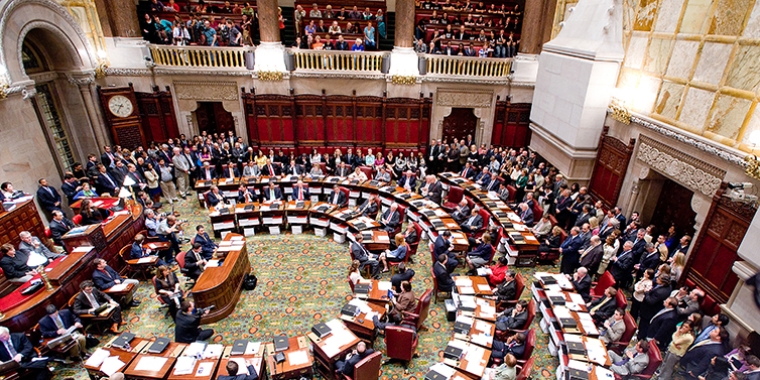
Senator Flanagan Seeks Accountability of State Use of Federal Stimulus Funding
John J. Flanagan
April 28, 2009
Senator John Flanagan (2nd Senate District) today joined with his colleague John A. DeFrancisco (50th Senate District) and Senate Republican Leader Dean Skelos (9th Senate District) to propose a comprehensive reform plan that will maximize job creation and ensure greater openness, transparency and accountability with regard to the billions of dollars in federal stimulus funding New York will receive over the next two years.
The two lawmakers, along with their Republican conference, publicly criticized the total lack of oversight and accountability regarding the spending of billions of dollars New York State is receiving from the federal American Recovery and Reinvestment Act at a press conference in Albany.
“According to published news accounts, not one single New York-based job has been created as a result of the largest job creation stimulus package in our nation’s history,” Senator Flanagan stated. “Making matters worse, no one seems to be able to tell the public exactly where this money is going, and how much money is left to spend. The Governor has publicly announced transportation projects that he says would be paid for with stimulus money but the federal government and his own transportation commissioner tell different stories.”
Senator Flanagan said he received a letter from New York Department of Transportation (DOT) Commissioner Astrid Glynn which stated that DOT “has not made allocations of federal economic recovery funds to its regions.”
“Governor Paterson has issued a number of press releases announcing transportation infrastructure projects that he says will be paid for by stimulus money. But according to a report by the federal Government Accountability Office, New York has only two transportation projects that have been awarded contracts to receive stimulus money with no new jobs being created,” added Senator Flanagan.
“It appears the Governor took transportation projects already on the books to receive state funds and shifted them onto a list for federal monies,” Senate Republican Leader Skelos said. “If that’s the case, it’s nothing more than a shell game with tax dollars that won’t create any new jobs. Without the kinds of openness and accountability reforms we are proposing, the taxpayers won’t know how the stimulus money is being spent.”
The $787 billion American Recovery and Reinvestment Act of 2009 was signed into law on February 17 by President Barack Obama. This unprecedented relief package includes a total of approximately $24.6 billion in Federal Aid for New York State – representing one of the largest intergovernmental transfers of funding in the history of our nation. According to federal officials, the funding is designed to help stabilize the economy, create jobs, prevent tax increases and prevent dramatic cuts in key government programs.
“When we debated the state budget I asked the Chairman of the Senate Finance Committee how much stimulus money was in the budget and he couldn’t answer the question,” Senator DeFrancisco said. “I wrote Senator Kruger a letter asking for that information and he never responded. It has taken almost a month to get a fiscal plan that shows where the money is coming from and where it is going. There needs to be greater accountability for billions of federal and state tax dollars.”
The comprehensive reforms proposed by Senate Republicans will address this problem and ensure that this money is spent wisely, efficiently and in a manner that creates real jobs for New Yorkers. The key measures, many of which have been advocated by a wide array of good government groups, include the following:
- Strict Fiscal Reporting and Monitoring: The initiative would provide the State Comptroller, as the State’s chief fiscal officer, with broad new powers to actively monitor the flow of federal stimulus funding. By giving the Comptroller specific and direct oversight responsibilities for these monies, the public will be better assured that no funding will be lost to waste or misuse.
- Job Creation Tracking and Results: To bolster existing federal job tracking guidelines, the plan would empower the State Comptroller to obtain detailed information from the State Department of Labor and the Empire State Development Corporation regarding specific job creation and retention numbers that are tied directly to the expenditure of stimulus funding. These figures would be certified by the Comptroller for accuracy, publicly released on a monthly basis, and made available on a new website to be established by the Comptroller’s Office.
- Combating Fraud, Waste and Abuse: The unprecedented size and scope of the federal stimulus funding creates a tremendous new potential for fraud, waste and abuse – both in the decision-making process, as well as in the actual implementation of related government contracts and programs. The new initiative would provide the Attorney General’s Office with the power to investigate and prosecute cases involving the misuse of stimulus-related funding.
- “Taxpayers Right to Know” Provisions: In order to heighten public awareness of, and involvement in, the allocation and use of federal stimulus funds, the current decision-making process must be moved out from behind closed doors and into the public realm. (The newly enacted State Budget, which was negotiated entirely in secret by Governor Paterson, Assembly Speaker Sheldon Silver and Senate Majority Leader Malcolm Smith, reportedly spends more than $8 billion dollars in federal stimulus funding.) To address this problem, all future meetings regarding the disbursement of these funds should take place in open, public meetings. These meetings should be webcast live, and the minutes should be made publicly available afterwards. Supporting documents should be placed online in advance of such meetings.
- Plain Language Budgeting: At the present time there is a significant amount of public information regarding the federal stimulus funding on various government websites, but there is no simple breakdown that provides the public with information regarding where the stimulus funding is going, and how much is currently being held in reserve by state leaders. The plan advanced by Senator Flanagan will empower the State Comptroller’s Office to establish clearly articulated “plain language” guidelines to track the flow of the federal stimulus funding.
- New Federal Stimulus Lobbying Provisions: The plan strengthens the State’s lobbying oversight and regulation by putting in place the same guidelines President Obama has already established for Federal Agencies that disburse stimulus money. These measures would apply to all stimulus funding disbursed at the state level, and to all government contracts let at the state level, that are associated with the federal stimulus funding. The measure would apply to all lobbying of State agencies, public authorities and the Executive Chamber, that relate to the federal stimulus package.
- Preventing Conflicts of Interest: The initiative includes provisions to encourage competitive bidding of contracts to the maximum extent possible, as well as prohibitions against public officials working to direct funds toward firms in which they, their family members or their business associates have any financial interest or employment connection.
- Federal Stimulus Whistleblower Provisions: Any government employee or private citizen who brings to light cases of fraud, waste or abuse involving federal stimulus funding would enjoy full and complete protection from any retribution.
“This funding belongs to New York’s taxpayers -- and it is not a political piggy-bank to be secretly carved up by a small handful of elected officials and lobbyists. The public and the press have a right to know how this money is being spent, where it’s going, who is involved in the decision-making process, and how many jobs its actually creating,” said Senator Flanagan. “We also need to establish a fully transparent, non-partisan process that will increase public involvement, and provide strict penalties for fraud, waste and abuse in the disbursement of these funds.”



